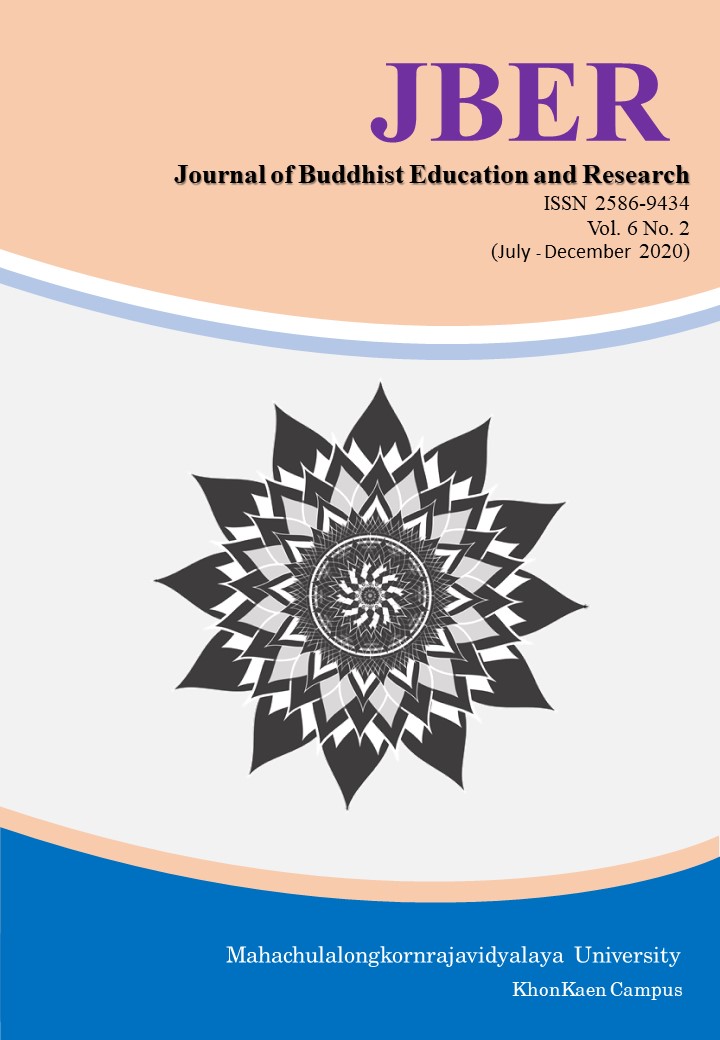THE APPROACH OF BUDDHA-DHAMMA APPLICATIONS FOR PREVENTING ALCOHOL ADDICTION OF PEOPLE AT PHASUK SUB-DISTRICT, WANGSAMMOH DISTRICT, UDON THANI PROVINCE
Keywords:
The approach, Buddha-Dhamma, Alcohol addictionAbstract
The purposes of this research were 1) to study the general state of people at Phasuk sub-district, Wangsammoh, Udon Thani province, 2) to study Buddha-Dhamma doctrines for preventing alcohol addiction of people at Phasuk sub-district, Wangsammoh District, Udon Thani province, 3) to proposes the approach of Buddha-Dhamma applications for preventing alcohol addiction of people at Phasuk sub-district. It was a qualitative research and documentary analysis and 25 interviewee key informants. The research tool was structured interview and field study data analyzed by descriptive method.
The results of this study found that:
- general state of people at Phusuk sub-district. Some alcohol addicted people had no appropriate behaviors such as making loud noises, annoying others, defying stings, and causing annoyance to participants. Such problem is getting more and more serious.
- The Buddha-Dhamma used for alcohol addicted people were the five precepts and the five ennobling virtues. The four and six causes of ruins and the threefold training.
- The approach of Buddha-Dhamma application for preventing of alcohol addiction of people at Phasuk sub-district, Wangsammoh, Udon Thani province are the five precepts and the five ennobling virtues especially no. 5, showing them the harm of alcohol addiction by giving an illustration or an example of an alcoholic for example depressed life of the addicted the poor family the depressed future of children in order to realize this truth. The concept of the four noble truths enables to understand the dukkha and samuddaya and set the goals leading to the end of problem and then having set the clear goal, the method and approach is the practice for preventing alcohol (magga). The concept of threefold training called morality, concentration and wisdom that the leader of Sangha at each area has their own moral support activity by integrating Buddhadhamma into the people’s heart. Furthermore, the concept of systematic thinking (yonisomanasikara) is meant to forging intellects as they really are and as the cause and factors i.e. right and systematic thinking.
References
จิรัชยา เจียวก๊ก และสันติชัย แย้มใหม่. (2558). การมีส่วนร่วมของชุมชนในการป้องกันการดื่มสุราในเยาวชน. ในการประชุมหาดใหญ่วิชาการระดับชาติ ครั้งที่ 6. มหาวิทยาลัยหาดใหญ่. 26 มิถุนายน 2558.
พระมหากำพล คุณงฺกโร. (2557). ปัญหาการดื่มสุราในสังคมไทย. วารสารวิทยาลัยนครราชสีมา. 8(1), 105-114
พลวัฒน์ ชุมสุข. (2561). การป้องกันและการแก้ไขปัญหาจากการดื่มเครื่องดื่มที่มีแอลกอฮอล์ตามแนวพุทธเศรษฐศาตร์. วารสาร มจร สังคมศาสตร์ปริทรรศน์. 7(3). 90-100.
สำนักงานสถิติแห่งชาติ. (2557). การสํารวจพฤติกรรมการสูบบุหรี่และการดื่มสุราของประชากร พ.ศ. 2557. กรุงเทพฯ: บริษัท เท็กซ์ แอนด์ เจอร์นัล พับลิเคชั่น จํากัด.
อุดมชัย อมาตยกุล. (2561). การแก้ไขปัญหาการดื่มสุราเชิงพุทธบูรณาการ. ดุษฎีนิพนธ์พุทธศาสตรดุษฎีบัณฑิต. มหาวิทยาลัยมหาจุฬาลงกรณราชวิทยาลัย.
อุดมศักดิ์ แซ่โง้วและคณะ. (2559). ข้อเท็จจริงและตัวเลข : เครื่องดื่มแอลกอฮอล์ในประเทศไทย. สงขลา : ศูนย์วิจัยปัญหาสุรา (ศวส.) สำนักงานกองทุนสนับสนุนการสร้างเสริมสุขภาพ และหน่วยระบาดวิทยา คณะแพทยศาสตร์มหาวิทยาลัยสงขลานครินทร์.





